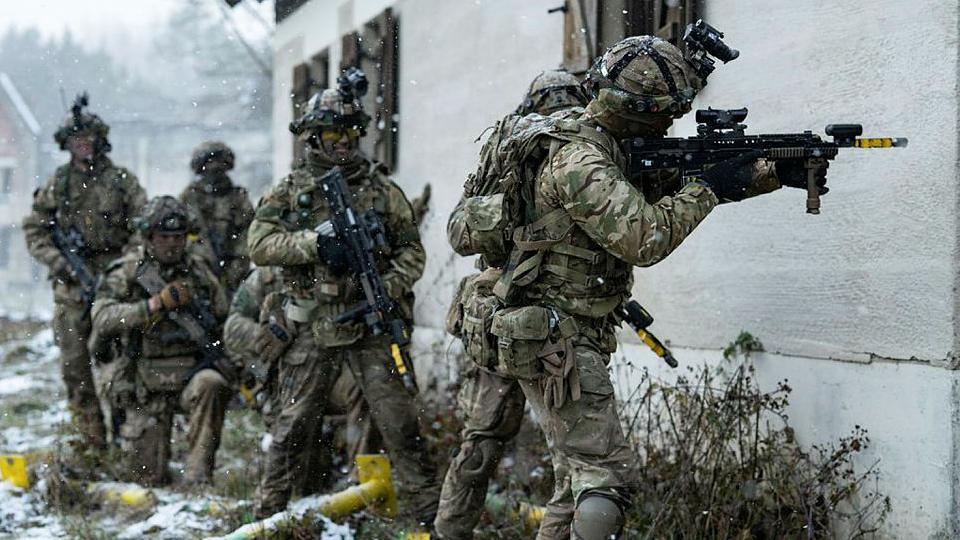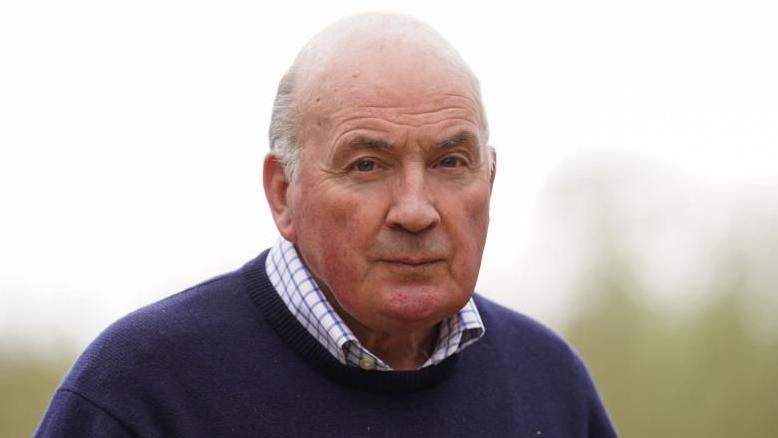UK military too 'run down' to lead Ukraine peace mission - ex-Army chief

- Published
The UK military is "so run down" it could not lead any future peacekeeping mission in Ukraine, the former head of the Army has said.
Lord Dannatt told the BBC that up to 40,000 UK troops would be needed for such a mission and "we just haven't got that number available".
It comes after Sir Keir Starmer said the UK would "play its part" in guaranteeing Ukraine's security after the prime minister was asked this week if he was open to sending British troops as peacekeepers.
A former Nato chief told the BBC that Britain and France should lead a force of up to 100,000 troops as part of a long-term peacekeeping effort should Russia's war with Ukraine end.
US President Donald Trump earlier this week announced he had had a lengthy conversation with his Russian counterpart, Vladimir Putin, and that negotiations to stop the "ridiculous war" in Ukraine would begin "immediately".
Trump then "informed" Volodymyr Zelensky, the Ukrainian president, of his plan.
Lord Dannatt - who was head of the Army from 2006 to 2009 - agreed that a force to keep the peace would require about 100,000 troops.
However he said the UK would have to supply "quite a proportion of that and we really couldn't do it".
"Our military is so run down at the present moment, numerically and as far as capability and equipment is concerned, it would potentially be quite embarrassing," he told BBC Radio 4's The Week in Westminster.
"I mean, if we were to deploy 10,000 troops, each rotation for six months, that would effectively tie up 30,000 or 40,000 troops and we just haven't got that number available.
"So there are some big issues here that today's politicians won't really have considered."
It comes as Britain's foreign and defence secretaries called on the UK and Europe to "do more" to "share the burden" of regional security in a joint article for the Daily Telegraph on Saturday.
UK Foreign Secretary David Lammy said he was "very encouraged" by his talks on Ukraine with US Vice-President JD Vance on Friday, on the first day of the Munich Security Conference.
"We share the view that there has to be an enduring peace," Lammy told Reuters news agency following the meeting.
"There was an agreement that Zelensky and the Ukrainians have to be part of that negotiated deal."
The talks came after Vance gave a speech at the conference, in which he was expected to address possible talks to end the war but instead attacked European democracies.
In the address, he said the greatest threat facing the continent was not from Russia and China, but "from within".
He added that Europe must "step up in a big way to provide for its own defence" and said he hoped a "reasonable settlement" could be reached for the war.
Lammy and his defence colleague John Healey said that Putin had for two decades sought "to recreate the Russian empire and suffocate the countries around its borders".
"Too often in the past, the West has let him," they said in the Telegraph.
"We did too little in 2008 when he invaded Georgia, and in 2014 when he first went into Ukraine."

Lord Dannatt warned the UK could not supply the troops needed for peacekeeping in Ukraine
Anders Fogh Rasmussen, who was Nato secretary-general from 2009 to 2014, said "a number of European countries need to step up to the plate" for any peacekeeping mission in Ukraine, adding that the UK and France should lead that coalition by putting boots on the ground.
"I would let military experts determine [the number] but my guess would be between 50,000 and 100,000 troops," he told BBC Newsnight.
As of October 2024, there were 74,612 members of the UK's regular Army forces (excluding Gurkhas and volunteers), according to the latest Ministry of Defence (MoD) figures, external.
The Army has targets on how many new recruits below the rank of officer it should take on every year, set out by the MoD. These targets have been missed in almost every single financial year since 2010-11, according to a written answer to Parliament last January.
Starmer backs Ukraine's Nato bid despite US view
- Published14 February
The Army is shrinking - but would Labour make it any bigger?
- Published3 June 2024
Ukraine war talks start now, Trump says after Putin call
- Published13 February
Lord Dannatt said the Labour government would need to "look at their priorities", adding: "Yes, health, education, roads, infrastructure are important, but actually defence and the security of this nation are more important."
The crossbench peer said he believes the UK government needs to go further than its commitment of increasing defence spending to 2.5% of GDP - a pledge that they have yet to put a timeline on when it will be delivered.
Zelensky has previously asked for the UK and other European allies including France to send troops to Ukraine for a peacekeeping operation after the war.
Sir Keir last month signed a "landmark" 100-year pact with Ukraine, building on the £12.8bn the UK has already sent to the country, with further commitments of £3bn every year for "as long as it takes".
The UK will also continue to train Ukrainian troops, 50,000 of whom have been trained on British soil so far.
In response to Lord Dannatt's comments, an MoD spokesperson said Britain's armed forces were "respected worldwide for their professionalism and excellence".
"Right now, the Ukrainians are still fighting with huge courage. Our government is stepping up support for Ukraine's war fighters to put them in the best possible position for any talks.
The spokesperson cited a £150m "firepower package" announced this week "providing more drones, tanks and air defence systems".